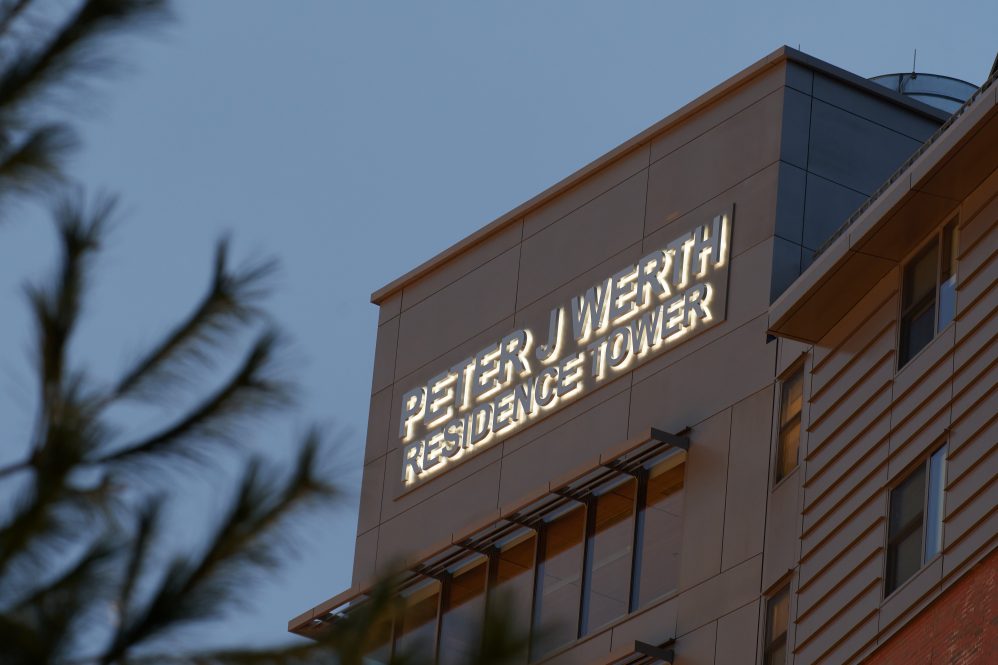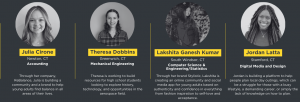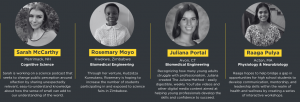Of the 33.2 million small businesses in the United States, nearly 13 million of them are owned by women - generating about $1.8 trillion in revenue and employing almost 10 million people. But despite the lifeblood that they contribute to the U.S. economy, women - particularly those from historically minoritized communities - continue to face […]

(Peter Morenus/UConn photo)
Of the 33.2 million small businesses in the United States, nearly 13 million of them are owned by women - generating about $1.8 trillion in revenue and employing almost 10 million people.
But despite the lifeblood that they contribute to the U.S. economy, women - particularly those from historically minoritized communities - continue to face persistent barriers to their entrepreneurial success, including a lack of access to venture capital, difficulties accessing and affording childcare, and gaps in mentoring opportunities that can aid in starting or advancing a business.
Since 2020, UConn's Peter J. Werth Institute for Entrepreneurship and Innovation has worked to address head-on some of the challenges for women entrepreneurs by offering critical support to young women founders at the start of their entrepreneurial journeys.
The First-Year Women Werth Innovators program - formerly known as F3, one of the institute's signature programs - was designed to engage diverse and multidisciplinary cohorts of first-year undergraduate women to provide them with mentorship, networking, and resources in order to develop their entrepreneurial skills and launch their own ventures.
"Once you're a Werth Innovator, you're always a Werth Innovator," says Katie Britt, the Werth Institute's director of leadership development, "and one of the hallmarks of this particular program has been how effective a collaborative approach to entrepreneurial learning can be."
Alumni from the first cohort graduated this past spring, making their mark on the University and the Werth Institute in a variety of ways - from establishing the first secondhand clothing store on the Storrs campus, to building an online community dedicated to sustainable fashion, to using a food blog to enhance learning and share nutritional knowledge with others.
"Self-confidence develops from doing," says David Noble, director of the Werth Institute. "These young women took a step toward being leaders in entrepreneurship at UConn because they gave each other the support necessary to keep doing and develop that confidence that they can do anything in the world that they set their mind towards doing."
And while the program has grown and evolved since its inception, its mission of engaging early entrepreneurs to help serve as a catalyst for professional and personal discovery remains the same.
"What we've seen with this program is just how curious, creative, and resilient UConn students are when they're given the opportunity and the support to have the courage to explore their own ideas," says Britt.

Helping Others
The students who join Werth Innovators don't need to know exactly what they want to create or how to go about doing it. Interest is all that's required.
For Juliana Portal '27 (ENG), the interest that first attracted her to the program was fashion.
"I went to the Involvement Fair, and Yuliana [Tsapar '24 (BUS/CLAS)] was hosting at the booth," says Portal, who is from Avon. "I love fashion and art and stuff like that, and she was talking to me about her experience, how she created a whole blog, and then she went to live in Paris for a little bit. She did all this stuff with fashion, and I was sucked in right away. I went right to my computer and applied."
A biomedical engineering major, Portal hopes to eventually focus on biomechanics in her career - working on things like prosthetics or devices for the body, like shoulder or hip replacements or other medical devices.
"I've always wanted to help people in some kind of way, through medical field, but I just couldn't see myself as a doctor," she says.
Biomedical engineering, though, is a way for her to help patients without being a doctor.
And helping others is also the focus of her venture, The Juliana Method. Through Instagram, Tik Tok, and a YouTube channel, Portal has created and shared content focused on helping young adults build professionalism skills - something she felt like she needed to work on herself.
"I found that we, as college students, are not ready for the workforce in different ways," Portal explains. "When I went to my first interview, I bombed that so bad. I just didn't know what to say. I asked the wrong questions. I was so nervous. And then, in the next interview, the same thing happened. I bombed. It was so bad.
"I realized that if this was an issue for me, I'm sure it's an issue for other people as well. Even networking or knowing what to wear - it's so confusing sometimes and very stressful. So, I wanted to focus on a project where I can learn, but then also teach others as well, so that they feel more comfortable."
To create her content, Portal stepped outside her comfort zone and interviewed a slew of experts - from alumni mentors to staff and faculty at UConn to industry recruiters - to share their advice and best practices on everything from interview prep to résumé writing to navigating a career fair.
Over the next year, she hopes to keep creating content and evolving The Juliana Method to continue encouraging others in new and different ways.
"My new Method would be to take experiences with a grain of salt, and to not be nervous and not let nervousness stop you from taking risks and trying new things," she says. "I really want to push people through my videos and other content to try new things and not be scared."
Living Authentically
Lakshita Ganesh Kumar '27 (ENG/CLAS) also has a deep love for fashion, and she's bringing that love into her venture, called Stylistic.
A computer science engineering and statistics major and commuter student who grew up in Ellington and now lives in South Windsor, Ganesh Kumar found fashion as a way to show who she is as a person to the world.
"I used to live in India when I was younger, and obviously Indian fashion is very fancy," she says. "When I moved to America for the first time, I was in third grade, and it was different, because people didn't really look like me. They didn't really dress in the way that I was used to. I was one of the only Indian girls when I was in middle school and high school. So, it was hard for me to just fit in."
She was in the tenth grade when the global pandemic took hold, forcing her to be by herself when her high school switched to remote study, and during that time, she began to find herself in fashion.
"It kind of allowed me to pull away and feel less insecure about myself, and I just started wearing whatever I wanted to wear," Ganesh Kumar says. "I came back in eleventh grade for in-person school, and it was just a huge change. All of my friends noticed that I had become so much more confident, and that I just walked different, and I dressed different - having that type of personal power in myself made me feel so empowered and so happy in my skin."
It's that same kind of empowerment that she's hoping to bring to others through her venture, and to do so, she's combining fashion with another of her interests - coding.
"I love coding - I literally love it so much," she says. "It is so frustrating to code, because it is difficult to learn. But once you get it, it's so satisfying. And I think my brain is just wired that way, to think logically and to think in the code.
"I like the way that I can create a lot of different things with it. You can use coding in a lot of different industries. It can be in fashion, or it can be in full-on tech or AI. There's so many different ways that you can go about it."
The way she's going about it is by developing Stylistic into a social media app where she hopes to create a positive online community that empowers young people to be their true selves and to interact with each other in authentic ways.
"It's like you're getting inspiration from people in your own life," she says. "You're getting inspiration from your friends, who are wearing stuff that's similar to you, rather than getting inspiration from influencers or celebrities, which is usually less authentic and more posed."
She's spent the summer growing her own online presence through her website and blog, Instagram, and YouTube, while also working on her app, which is currently available for pre-order.
Ganesh Kumar has had to learn how to code a mobile app all on her own - something she hasn't actually learned in her computer science classes yet - but she's found support through the Werth Institute to pursue her venture despite her already busy life.
"The best advice is for other students to just go for it and just try, if you feel like you have an idea, or even if you don't have an idea," she says. "They are there to help you, and they're there to guide you, and they're there to figure out ways that your idea can fit into your schedule as well."

Finding Balance
Helping young adults balance their busy lives is big part of what Julia Cirone '27 (BUS) wants to accomplish through her venture, ReBalance.
The accounting major from Newtown has always had an interest in entrepreneurship, she says, and she sought out opportunities to engage with the entrepreneurial community at UConn as soon as she started her first year.
"I went to the Involvement Fair, and I signed up with CCEI," Cirone says, which is how she eventually became connected with the Werth Institute. "I just think it's really, really cool and fascinating how you can have this idea in your head and it creates an actual community of people who agree with the same thing that you do. And it makes a difference, because you can create something that's improving the quality of somebody else's life."
ReBalance, she says, is a reflection on her own life and how she spends her own time.
"I always sign up for every single thing I can - I am very multi-passionate," she explains. "And so, I created ReBalance where I'm trying to motivate and encourage other people to balance all of their goals at the same time, especially if those goals are in different areas of your life. Because we all have our educational goals, but I never want to lose sight of my personal goals.
"So, I'm trying to spread the mission of living with intention."
To support her efforts to help others find balance, she's launched a website and blog, Instagram, and TikTok where she shares content founded in research and evidence-based practices to help encourage others to find balance.
She's written a workbook to help guide users through setting what she calls "bite-sized" goals, three months at a time. She started offering her book for sale this fall.
"I think back-to-school time is a perfect time for people to start setting goals," Cirone says. "It's a three-month window, strategically, because the semester is about three months and that's kind of the time when we're sitting and we're focused and geared into our lives and improving."
She's also partnering with a local jeweler to offer bracelets with her signature moon-and-sun logo to accompany the workbook as well as a line sweatshirts and other items based on the same theme.
"The sun is your professional goal during the day," she explains. "The moon is your personal goal, and then there's a stone that means strength."
At UConn, she says, she's found the opportunity to explore all of her ideas, try things out, exercise her creativity, and work on constantly rebalancing her own life, all in the midst of a community of fellow entrepreneurs willing to offer an ear or lend a hand to those just starting out on their own journey.
"The entrepreneurship clubs and communities on campus - they're very small, but they're very tight knit, and you'll immediately be given an abundance of resources and support from these people," Cirone says. "They want to see you create, and they want to see you succeed."






